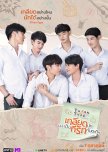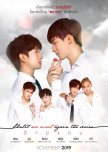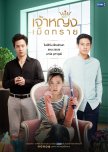
Some Day Or One Day?
100 personnes ont trouvé cette critique utile
The writing/direction/production team all paid close attention to detail and crafted both scenes and sets with clues and forshadowing that make it the perfect sort of show to rewatch.
For anyone who is into story analysis, it struck me in the closing scenes that they wrote a Hero's Journey into a romance plot (not along side it, but literally, the romance IS a hero's journey), which is really something amazing. I can't say I've ever seen it before. So, I feel like it's not hyperbole when people say this is the best show they've ever watched. It's pretty amazing.
(Original review written around episode 8 below):
There's so much going on in this series that I love. The writing is tight, well paced, and presents at the same time a fascinating puzzle of a time travel story; a deep reflection on grieving; a thriller-type murder-mystery; and a double romantic comedy, played out in different timelines. It is genuinely a cross-genre show, so don't go in expecting pure comedy OR pure drama.
The acting is fantastic. I have always thought Alice Ke was an exceptional actress and she's not disappointing here. I liked Greg Hsu in Love Storm, and he's even better in this. The whole cast is great, but these two really shine. Directing. It's brilliant. Together, the writing and directing are letting the mystery of the time travel as well as the murder unfold in a way that raises new questions as it answers old ones. The directing includes so many little details that not only draw us into the mystery of the time travel, but hint at the more overarching explanation of what is happening. There are nice little symbolisms, like the red earbuds that the leads share at times, which creates a red thread linking them. There are also many conversations and dreams that we see early on that take on new meaning as the story unfolds, giving a sense that all the details matter... there's no filler here.
There are some more ambiguous symbols as well. There's some significant representations of enclosure and separation/isolation. These could represent grief and loss, which is a major theme in the drama, but they take on additional potential meaning in terms of what is really happening... that there is loss, grief, and perhaps the potential to heal or even change the past is a given. But what isn't given is that what we see is the actual story; many of the symbols reinforce the sense of fragmented reality that the female lead experiences in both her grief and her early experience of time travel.
For example, the "broken audio/video" shifts between scenes, especially with time travel, play into the fact that in the first few episodes the transition from an ordinary story about living with grief to a supernatural story about time travel/fate is started by the use of technology, once to find a "doppleganger" and the second time to use virtual reality to "reunite" with the lost love. While nothing much is made of this (and as of the 8th episode, it hasn't become a factor), these sorts of hints are beautifully done. They make it harder to guess the overarching explanation while at the same time they work on their own. That is, if it turns out that they were never anything more than a couple of scenes in the first few episodes and had nothing to do with the over-arching story, they still work. They aren't just red-herrings to obscure the truth, they are integral moments in the character development and plot that *could* mean more.
Long story short: it's fabulous, and given how well done it is so far, I'd really be surprised if it stopped being fabulous.
Cet avis était-il utile?

So this is not the drama to watch if you want to think deeply about the world or be moved by something new or profound. It IS the drama to watch if you just had surgery and you need something to keep your mind off the pain while you recover, or if you are that combo of bored and distracted that means you can't keep track of complicated plotting, or if you're feeling sad generally and want to watch an angst-light bickering couple be adorable at each other for a while.
One point I thought worth making is that the premise of forced marriage and subsequent escape/chase as the base of a romantic relationship is tricky to handle well. The show does a great job of balancing the characters and the romantic development so that it doesn't feel like the female lead is intimidated into love or suffering from Stockholm syndrome or something. His intentions towards her aren't creepy, and while she's attracted to him early on, she doesn't fall for him until much later when the power balance between them is much more equal (side note: I would hesitate to call this a "historical".... it's thoroughly modern in terms of the ideas that the characters have about love and morality).
There's a lot of reviews already so rather than describe the show again, I'll respond to two of the major flaws that have bothered other people: plot, and the female lead's character.
Plot: This feels adapted from a web novel, and so rather than a straight plot that carries us from beginning to end, there are definite arcs: The Island Arc, the Escape/Chase Arc, the The Black Gang Arc, and the White Jade Arc. We drop some characters along these arcs and move to new locations where new characters come in, so the beginning of each arc is a bit like starting a new show, with some ramp up time before the story gets going again. The transitions to the Black Gang arc and the White Jade arc are a bit choppy, so our gang of heroes ends up talking about goals for a while and the audience is like "huh? Explosion? What? Coverup? How did we get here?"
Eventually everything makes sense again and it's pretty easy to fill in the gaps, so if you're in it for the cute couple it's not a major detractor. But if you really want a compelling and tight plot, you will definitely hate the transitions and probably not enjoy the show much overall.
Lead Female: She is a bit screetchy at the beginning, and I think the type of character (her backstory) isn't well enough established early on to make sense of some of her actions. However, she's actually a pretty good character once you get her (and the screaming subsides), so here's my take on her: She's a general's daughter who is stubborn, book-smart, and has an intense sense of justice and desire to do good in the world. She's been indulged, but not *specifically* trained. So she's grown up around martial arts and picked up some things, and she knows lots of tricks that she's read about and is decent at putting together traps or thinking her way out of a situation. BUT she's not that great at anything other than slingshot. She's got a lot more courage than experience, so when she starts having experiences, she isn't always prepared for what's happening.
What I liked about her character was that for everything except cooking, what they established that she was good at remained good throughout the show (and the cooking is a really minor exception). So, she has a photographic memory, which is useful even at the end. She's good at tricks and quick thinking. She doesn't use them every possible time, but she doesn't get "dumber" over time as some smart characters tend to; in fact her skills improve. The pirate actually changes to get better at trusting her and acknowledging her strengths, and she learns new skills. It's not *amazing* but it is well done enough to keep their relationship interesting throughout the show, which is great because the romantic arc is such that the show could have suffered from early bed death.
The show was a ton of fun for me. I even loved the cheesy costumes (caterpillar eyebrows!!!!) and props, which offered their own laughs at times. The show never takes itself to seriously, which is what you want for a low-budget comedy low on realism and loose with plot. A high production value would have made the historical inaccuracies and trope-heavy plot unbearable.
Cet avis était-il utile?

Cette critique peut contenir des spoilers
I stuck with this series because of the acting. Gulf did an amazing job with Type and Mew, when his character wasn't creepy or crying, was pretty fun. Mild's Techno was wonderful, I much preferred his interpretation of the character than the one in Love By Chance.Having watched now both T/T and LBC, and read a bit here and there about the other storylines of the novels, it seems that virtually every storyline in this story universe has some element of sexual assault in the backstory or conflict (even Ae/Pete, which is a wholly consensual relationship, is triggered by a sexual assault and blackmail that Pete is trying to deal with). These plot device assaults are not dealt with well, the effects on the characters come and go as suits the storyline, and there are no consequences for rapists. When characters we are supposed to like commit assaults, it's treated as part of the romantic development rather than called out for what it is.
This is particularly badly done in T/T. Type has a traumatic, really major sexual assault in his history. In the entire series, the only scene in which this history was used in a way that felt realistic and important is when he recognizes Tar's trauma, which occurs in the last episode.
Tharn is gross. Just awful. He has zero respect for Type's boundaries. He sexually assaults him multiple times: in the shower; while he's sleeping; tells Type to "watch his ass" after they become friends again and after Tharn knows about Type having been kidnapped and raped; pushes him into a wall and threatens him when he thinks Type is flirting at a bar... just horrible. He agrees to have sex with Type even when Type explains that he is offering because a) he feels like he owes Tharn and b) he's afraid Tharn is going to do it at some point anyway so he wants to get it over with. When someone tells you they don't think they can say no to having sex with you because of factors that don't have to do with their immense desire to have sex with you, going ahead and having sex with them is rape. The writing completely ignores the coercive element of their first time. No, in fact, afterwards, Tharn tells Type that even though he said they could do it just once, it wasn't going to be just once, and then proceeds to continue to pester him until Type gives in again, which basically marks the start of their "romantic" relationship.
These constant assaults are not treated by the writer or director AS assaults, never problematized or called out. They are also really confusingly shot and plotted, to the point where at the beginning I thought we were seeing Type's fearful dreams/worries playing out (which would have been MUCH better, in that we would have understood more Type's reaction while being able to continue respecting/liking Tarn)
On top of the outright assaults, Tharn is horribly emotionally manipulative. We can, of course, dislike Type's homophobia. But given that it's routed in trauma, and that Tharn knows this, a realistic and compelling storyline would have Type moving through his fears and overcoming his prejudices while Tharn gives him some emotional space to process these changes and reconsider his worldview.
What we get instead is that every time Type concedes something, Tharn pushes the next boundary without asking and then gets mad/withdraws affection when Type is upset. On the very day that Type admits they are something more than friends, Tharn convinces him to go out into public and then kisses him IN PUBLIC without asking. On what planet would you expect the traumatised, recently severely homophobic guy who is struggling with his sexuality and only hours ago was willing to admit that maybe, just maybe, there's something more going on between you than being fuck buddies is suddenly ready to be outed at a bar? None. Actual people who understand relationships would not make that move and if they did, they would understand that THEY were the ones who did something wrong.
What does Tharn do? He gets mad, sulks, leaves for days and doesn't come back until Type apologizes.
The Tar storyline is also terrible, but I'm going to leave it here. I can't honestly recommend the show, although I can understand if you just want to kind of close your eyes/mind to the flaws and try to enjoy the fluffy parts, because that's clearly what I did. The characters are so inconsistent that when they are not being awful, they are pretty cute and likeable, so the fun fluffy scenes are there. Still, I'm not sure if it's worth it. I feel sort of gross for having watched it to the end.
Cet avis était-il utile?

Une Odyssée Orientale
6 personnes ont trouvé cette critique utile
Cette critique peut contenir des spoilers
Love it or hate it, it's probably better than you think
Spoiler-free Review (as much as possible)I think this is sort of a love-it-or-hate-it kind of show, in particular because there is a difference in tone between the first and second half that can make it frustrating for people who like a little magical realism rather than a full-on Taoist cultivation magic/gods are real/demonic creatures abound sort of fantasy.
Make no mistake though, despite the weirdly (and great!) "Steam Punk Sherlock Holmes in the Tang Dynasty" vibe of the first half, it is a full-on fantasy NOT a period piece with some "unexplainable-maybe-magic, acupuncture-just-works-for-some-reason, sure-people-can-jump-that-high, handwave handwave" sort of fantasy. It has all those elements, but they are grounded in the full mytho-religious scope of Chinese historical lore--akin to how Lord of the Rings is grounded in the full scope of European lore. In this show, magic and cultivation are real, are understood by people in this world to various degrees, and immortal cultivation is possible. If you are expecting this kind of world, the plot is perfectly comprehensible, and the choices characters make lead reasonably logically to the next scenario. If you are expecting minimal fantasy in a mostly "period" setting, it's going to throw you for about a million loops, especially after the magical quest picks up.
The romantic arc is, I think, explained well by a comment the Tang Empress makes maybe about a third of the way in: that a lasting relationship requires that couples have equality. She's not strictly speaking about a political kind of equality (like, it's not a feminist statement nor is she *exactly* talking about status). She is somewhat talking about feelings, somewhat about status, and somewhat about how they see each other--which encompasses feelings and status and respect. This, for me, was the reason the MC couldn't be together in the first half: they were unequal; and it drove many of the plot progressions in the second half.
Overall, if you hang in to the end *most* of the stuff that makes you go "huh?" is explained, and it's a really entertaining ride full of great acting. I recommend it to people who like fairly fluffy high fantasy with good characters and enjoy plots that take them for a ride.
***************************
Spoiler-light review of the ending: was it happy or sad?
I have no particular issue with the ending in terms of *what happened*... but I did find the last scene weirdly abrupt and it took a while to interpret it. Key to understanding the ending is noting that the main characters are experiencing a calamity/tribulation (which is stated near the end by the character with the best grasp of what's going on). In Western romance, happy endings are required and are defined as the couple together. However, I find that in Chinese romances, when a couple's love is entwined with "the fate of the world," it usually requires some kind of significant sacrifice and they usually do not end up both alive and together. Just like Western romantic endings, these can be done well or poorly. In my opinion, the ending fit the story and the world-building, and it was increasingly clearly inevitable--as an ending largely should be. It does not fit the standard Western "happy ending" but at the same time, I wouldn't call it tragic or bad.
*********************
Spolierish review of ending: what the heck was that last scene?
Scroll
scroll
scroll
Is Mu Le alive or dead? Well, the best interpretation I've seen (it is supported but subtle in the show; I read that this it is how the book explains it but I can't find an English translation of the book to confirm) is that he is the son of the goddess who made the beads. We see that the one egg shaped bead, which is the center one, survives. This is the bead in which Mu Le's spirit is sealed. So, basically Mu Le is a god. His mortal self perished, but he can't die. You can view the entire series as the "mortal tribulations" portion of a show like _Ten Miles of Peach Blossoms_ or _Ashes of Love_.
My personal take is that Ye Yuan An is also experiencing a mortal trial. Just a bit of head cannon; but based on the "equality" idea; that their love for each other is one that spans mortal and immortal status.
Anyway, because Mu Le is the god that seals the egg bead, him appearing at the end isn't just a sop to a happy ending after the inevitable sacrifice. It's actually him fulfilling his promise that if he has an afterlife, he'll spend it with her. So I would count it as a happy ending but presented in a not-very-satisfactory way.
********************************
Full of details and random spoilers analysis of what I liked and disliked. Read at own risk :)
Things I liked:
The Second Lead Couple: fully developed characters and a reason to be together besides just 'cause
A lot of time second lead couples in stories where one or both was originally in a love triangle with the lead/leads feel like they were given to each other by the author as a consolation prize for everyone with second lead syndrome. Not so in this case. First of all, their relationship is rocky *at best* for most of the series. Second of all, they're actually perfect for each other, if they can make it through all the rockiness--which is the essence of a true OTP.
Ming hui, the princess, is initially an antagonist. She has an unlikable personality, although she shows a different side in a few moments of vulnerability. When we later learn of her good motives, her personality doesn't change, but our perspective of her has a chance to. I LOVE LOVE LOVE that her personality stays difficult. It's easy to hate Ming Hui, and the writer *could* have gone for the stereotype that equates difficult personalities with being a bad person. She *could* have had Ming Hui turn out to be a sweet person and her undercover personality a mere persona . And that would have been super boring.
Instead she challenged us to find the good in Ming Hui, to find what was likable and consider what was forgivable. And she showed up what growth looks like in a person who isn't exactly bad, but is kind of selfish and prickly. Ming Hui, although not having much redemption from the stuff she did under cover (it's kind of excused as "what she had to do"), does experience real growth as she first tries to brute-force her romance and then realizes that she was wrong, and finally starts to figure out how to be a genuine person to the one she loves.
Despite Ming Hui's unilateral initiation of their relationship, the pairing between her and Lan Zhi actually makes sense. She seems very cold and calculating, but while she is extremely pragmatic about her duty and what she has to do to achieve her goals, she's actually very impulsive and emotional in her relationships. This leads to her initially hating Lan Zhi and Ye Yuan An. In my opinion, hating Ye Yuan An didn't make much sense, other than that Mu Le rescued everyone and her servant was the only one that died. But as the series went on, it became more and more obvious that Ming Hui and Ye Yuan An had these parallel experiences with loving a slave and being unable to do anything about that love (including admitting it to themselves). So I think that Ming Hui hated Ye Yuan An so much because Ye Yuan An still had Mu Le, whereas Ming Hui's love was dead.
But as time goes on and Ming Hui keeps encountering Lan Zhi, she has unsettling experiences with him that make her feel valued and seen, something she hasn't had much of in her life. He has also been the only person to see the potential goodness in her when she was undercover, and believe that she could do the right thing.
She feels strongly but has no confidants and isn't at ease being vulnerable, which means that she tends to repress her emotions to the point where they bubble out into irrational decisions. This means that when she takes such drastic actions to force Lan Zhi to marry her, he isn't able to take her claim to love him seriously. He believes her demand is about the rivalry with Ye Yuan An, not about any actual feelings for him.
Some people felt disappointed that he wasn't the ML. But I think the writer established that he wasn't right for her very early and in repeated ways. Whereas he sees the goodness in Ming Hui when she's putting up a front, he doesn't see the suffering or vulnerability of Ye Yuan An when SHE's putting up a front, nor does he recognize her as someone who has as strong a moral code and as much a need to act on it as he does. In short, he never actually recognizes their equality (in the sense the Queen talked about). In fact, he much more recognizes his equality with Ming Hui, as when he relates his childhood story of becoming a good person to her difficulties and potential for doing the same.
Lan Zhi's arc actually parallels hers a bit. His personality is also difficult. He tends to hide behind the letter of the law whenever faced with complexity. He is very judgmental and while he is fair, he is not kind. He can be selfish: although he said he wanted Mu Le in the army so Mu Le could gain some merits, he really wanted Mu Le away from Ye Yuan An. It was obviously going to end terribly (a supernaturally strong man who ignores propriety and will only somewhat take orders from one person who is not in the army is supposed to do well in the army??? No. Lan Zhi. You did not actually think that was how it was going to go.). He does not express his feelings to the people he cares about and his bearing is so rigidly law-abiding that it's easy for the people he loves to believe his feelings for them are not deep.
With Ming Hui, he has to learn a bit about forgiveness, and how to let go of the past. He learns to be more flexible, more vulnerable, and more expressive--but none of this to the extent that feels like a personality rewrite. I also like that he never comes to hate or distance himself from Ye Yuan An. Like, we get the definite feeling he's stopped pining for her and started loving his wife. But she's still his friend, she's still important to him. And it's still a difficulty in their relationship, which just read as really true.
You can totally imagine how them as a main couple would make for a sort of typical "arranged marriage, enemies to lovers" story, but enjoy it as a less developed side story because it's elements are in so many ways done to death.
.... okay.... this is crazy long. To be continued, maybe :D
Cet avis était-il utile?

Until We Meet Again
20 personnes ont trouvé cette critique utile
The TL/DR is: There's a core of a good story and some fun characters here. Watch it if you love BL, if you love any of the actors or the novel, but if there was ever a show to make use of the fast speed or preview functions, it was this one.
Now for the full pacing rant:
It's mainly a directing issue. The director is in love with slow motion, to the point where sometimes I watch on double speed and the only way you can tell it's not normal speed is because of the music. There are long, long long long....
......
.....
.....
.....
pauses that don't make sense. There are scenes that have extended periods with no plot or character development, just people unpacking groceries or doing their regular stuff. Which *could* be used to great effect if we were getting insights into our characters or hints about the story, but no. They're just unpacking the porridge or walking into the room where the action is going to happen, or looking across the cafeteria before the action happens or whatever.
Other than the pacing, the biggest frustration is the character of Pharm. I'm not sure if it's partially an acting issue because I haven't seen him in other stuff, but it is definitely also a writing and directing issue.
Pharm starts out cute and sweet... he's shy but also a good friend, likes to cook, and is generous. He crushes on Dean and finds it confusing, and he has these scary dreams and memories.
So far, so good. Except as the show wears on, he's basically always either experiencing excruciating shyness or crying. He cries constantly, and the director is fond of slo-moing or holding those moments for horribly extended amounts of time without developing any actual feelings or plot.
By episode 15, the relationship with Dean has gone from cute and sweet to deeply uncomfortable, because Pharm never seems into it. Every time Dean touches him or flirts with him (moments that *ought* to be the lifeblood of the show), Pharm screetches and hits him and says "no!" or "p'Dean!!!!" It seems like we're supposed to be seeing him shy, but since we never see actual desire or much in the way of enjoyment, it at first is super confusing: like, does Pharm actually like Dean? Is he okay with Dean but confused about his sexuality? Does he like Dean but not want to be with Dean? Is he confused about the relationship between Dean and the guy in his dreams? None of these questions are answered because there's almost no dialog addressing them and the direction (or possibly acting) means we can't tell Pharm's feelings beyond "I'm scared!" "I'm sad!" "I'm uncomfortable!"
As the show goes on and the relationship becomes closer, the fact that none of these important questions about how Pharm feels makes it more and more uncomfortable when Pharm is pushing Dean away or asking him to stop. It feels like whatever his feelings are, he's clearly *not ready* for what Dean wants, and it's getting less and less fun to watch them.
There's a wealth of side characters who could be used to help round out the show and let the director rely less on agonizingly long shots where nothing happens and more on fun interactions. Pharm's friends Manow and Team are great; their interactions tend to be fun, the actors have a good chemistry. Manow's love line was hinted in an early episode but as of ep 15 hasn't been touched again. Team and Win have a tiny but sizzling secondary couple thing going on that could easily have been given a touch more time without having to have the relationship develop faster. The pace of their relationship is totally fine and wouldn't have been challenged by, say, an extra 4 minutes per episode taken out of all the non-development moments. Less time on Pharm and Dean might have pushed the writer and director to make more of their moments together as well (I think that Team/Win and Korn/In are both more interesting in part because they had less screen time and so more had to be done with their characters... although Korn/In's story does drag at points as well.)
Cet avis était-il utile?

The angst never gets too angsty; the clingy second lead is annoying and wrecks things, but doesn't dominate the screen time.
I was at first hesitant because as a mom, I find stories that try to combine a romantic plot with a single-mother-of-a-toddler female lead tend to fall short. However, both the emotional and practical effects of the child on all the characters were well done.
There was some bumpiness in the writing around episode 11 or 12 that made it seem like something was resolved and then it wasn't in a way that was not very satisfying and left the story feeling a bit... off. But they got past that bump and ended it pretty nicely.
It's a solid escapism romance, perfect for when you're sick or tired or just need some distraction. Easy to binge watch and cute enough to use as a unicorn chaser for something more serious.
Cet avis était-il utile?
















